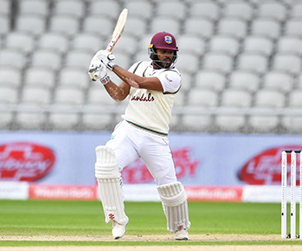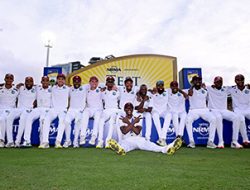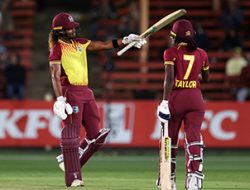While we may think that any form of analysis on the performances of the first Test against England, there are clearly some essential facts which should be considered. No one expects to judge the new coach on the initial performance of his team, although I am prepared to give Phil Simmons some credit for the application of the young batsmen Braithwaithe, Blackwwod and Holder.
My first observation was the accuracy of our three fast bowlers from as early as the first test match. This could be the information shared with them by Curtly Ambrose and of course the value of starting the series with quality bowling.
Maybe in hindsight, I would mention to the selectors that our history of playing against England in the Caribbean should have endorsed a selection of Bishoo, the talented wrist spinner instead of Sulieman Benn whose deliveries are more suited to keep runs down rather than taking wickets.
Some of us were around long enough to remember the effectiveness of spinners like Wilfred Ferguson in the fifties, Willie Rodriguez in the sixties when Boycott and company failed to read his spin and lost their wickets, Shane Warne in the more recent times.
There is reason for England’s failure to cope with wrist spin. Firstly, their climatic conditions and the regular bouts of moisture during their season have not produced wrist spinners of any quality, nor have they allowed the batsmen to use their feet to smother spin on the wickets. They thrive on the likes of Titmus, Illingworth, David Allen and Tony Lock, all orthodox spinners, who may well have allowed the English batters an adequate formula to deal with the likes of Benn and Miller.
Having looked superficially at the first game, my attention was focused upon the age of the chosen players in conjunction with their present performances. For many a year, we enjoyed the disciplinary approach of Chanderpaul with his unusual, but successful display of batsmanship, which brought him among the top of the world’s outstanding batsmen.
Today, the dapper little 42 year old Guyanese seems to have lost his rhythm which had produced the precision of a well-oiled stroke playing machine even though the strength of his commitment and dedication remains, but unfortunately without his agility and 20/20 vision for which he was gifted. I believe that the signal for the twilight zone is obvious in Chanders, especially when he has to spend a day and a half in 33 per cent Celsius heat prior to taking his turn at the crease.
His first 23 runs were scored in 80 balls, a similar rate to his batting partner Kraig Braithwaithe, a youngster whose array of shots are yet to be seen, despite his good scores. Then there are the now established veterans. Marlon Samuel, whose inability to retain the consistency even on a flat, docile wicket and against only three real quality bowlers in Anderson, Jordan and Tredwell appears to be lessening.
Some diehards may wish to point fingers at the more youthful batters like Darren Bravo and Denesh Ramdin, both of whom are in the prime of their careers. Clearly, the team needs the reality of players, who are described as competent, to be consistent as well. And, the same can be said about our bowlers.
The fact that we have come away with a draw is commendable as England’s bowling is highly ranked in the world. Can I humbly suggest that our selectors view the average age of our team and relate it to the amount of cricket of all sorts which they play? Then view the serious physical and mental toughness to endure during some very hot long days which would need strength, endurance, and excellent powers of concentration for success.
Without too much rest time for the second Test, we shall go again and take a closer look at the lot in order to recognise the true facts of the strengths of our team. I accept that there is an effort to reach the learning curve but words alone will not achieve that goal.




















